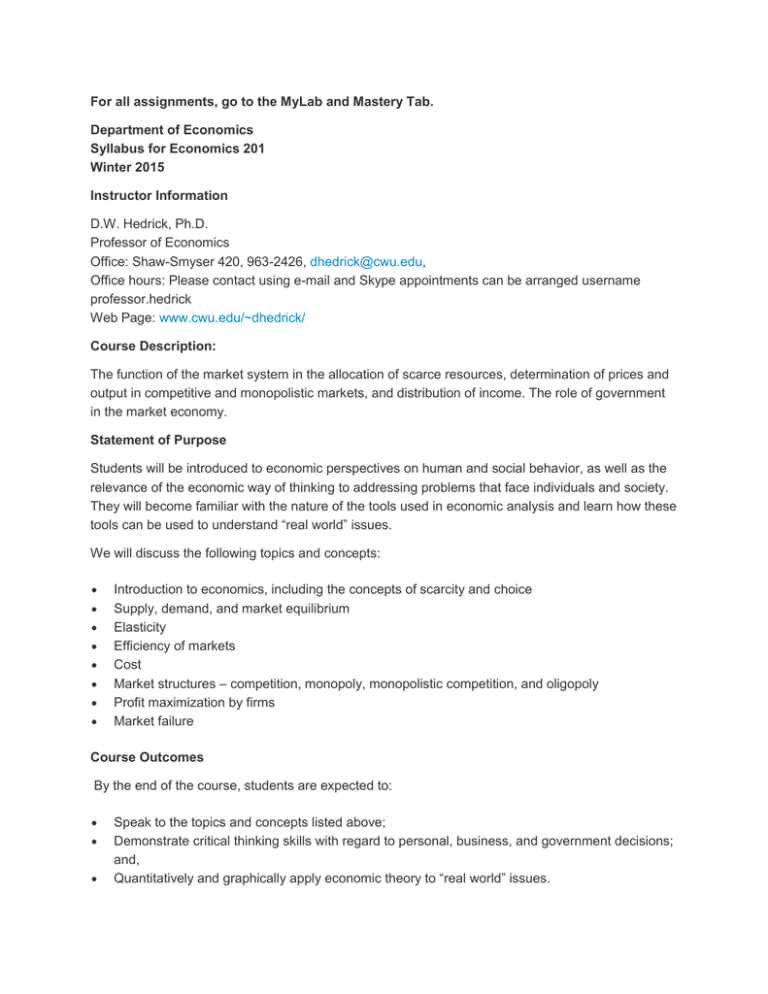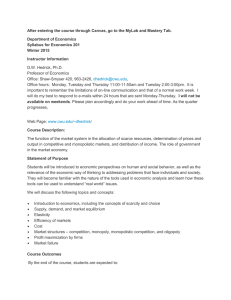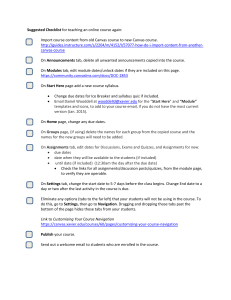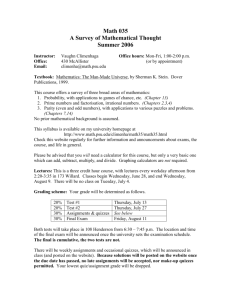Syllabus 201w15
advertisement

For all assignments, go to the MyLab and Mastery Tab. Department of Economics Syllabus for Economics 201 Winter 2015 Instructor Information D.W. Hedrick, Ph.D. Professor of Economics Office: Shaw-Smyser 420, 963-2426, dhedrick@cwu.edu, Office hours: Please contact using e-mail and Skype appointments can be arranged username professor.hedrick Web Page: www.cwu.edu/~dhedrick/ Course Description: The function of the market system in the allocation of scarce resources, determination of prices and output in competitive and monopolistic markets, and distribution of income. The role of government in the market economy. Statement of Purpose Students will be introduced to economic perspectives on human and social behavior, as well as the relevance of the economic way of thinking to addressing problems that face individuals and society. They will become familiar with the nature of the tools used in economic analysis and learn how these tools can be used to understand “real world” issues. We will discuss the following topics and concepts: Introduction to economics, including the concepts of scarcity and choice Supply, demand, and market equilibrium Elasticity Efficiency of markets Cost Market structures – competition, monopoly, monopolistic competition, and oligopoly Profit maximization by firms Market failure Course Outcomes By the end of the course, students are expected to: Speak to the topics and concepts listed above; Demonstrate critical thinking skills with regard to personal, business, and government decisions; and, Quantitatively and graphically apply economic theory to “real world” issues. Textbook Shrink-wrapped three-hole copies with the access code to MyEconLab are available at the CWU Bookstore, or an on-line version of the book is available directly from Pearson on their website which is accessible through the course Canvas site. Required: (1) Acemoglu, Daron, D. Laibson and J. List, “Microeconomics” Pearson. C. 2015. (2) MyEconLab. Pearson. - An internet-program that will serve as the platform for instruction, homework assignments, quizzes, examinations and other course requirements. Available through Canvas. Once you log into the Canvas course go to the MyLab and Mastery Tab and you should be prompted to register for MyEconLab. No payment is necessary for two weeks. Suggested Reading: The Wall Street Journal (contact Ms. Hood, Economics Dept Secretary, hoods@cwu.edu (963-2664) or visit the Econ Office 4th floor Shaw-Smsyer for the $10 subscription for 10 weeks) The Economist Course Requirements By virtue of enrollment in a College of Business Course class, all students are required to commit themselves to learning the material and to acting in a civil manner in all class activities. MyEconLab is a state-of-the-art on-line learning platform. At present, it is only partially integrated with Canvas. With the exception of graded discussions (under development), all required course assignments will be done and grades will be reported using the MyLab and Mastery Tab (to the left). MyEconLab has numerous tools to help you with studying the material. Let me suggest the following approach to learning: (1) Read the book (Pearson eText tab and/or the hardcopy from the bookstore). The authors have done an excellent job of structuring a interesting and provocative approach to learning microeconomics. (2) Use the resources available in the Chapter Resources Tab, which guide you to your assignments and include student lecture notes (Powerpoints with notes), animations of text material, and sample homework assignments and quizzes. (3) Please experiment with both the "study plan" and the "dynamic study modules" (on the Mylab Course Home page). They use adaptive technology to design a more efficacious study plan for the student. They are not graded so you can choose to use one, both, or neither - it is up to you. The "study plan" uses your responses in homework assignments and quizzes to alter your future study plan to address your weaknesses. To allow you to take advantage of the adaptions you should probably do the "study plan" after you take the homework assignments and quizzes and use it to prepare for midterms. The "dynamic study plan" appears to be something that generates immediate suggestions for study, therefore is probably best to take it before the homework assignments and quizzes. I would appreciate your feedback on usefulness of these tools as you experiment with them. (4) To avoid the impact of unexpected changes to your schedule, do all of your homework assignments, quizzes and midterms before they are due. (5) I am working on creating a non-graded discussion for each chapter to allow you to ask questions or request help on an assignment. Since it allows all students to benefit from advice, I would prefer to use this method, rather than individual e-mails, to deal with non-personal course-related questions. Individual e-mails will also be accepted. Grades will be based on chapter homework assignments (15% - unlimited attempts), chapter quizzes (25% - two attempts), and three midterm examinations (60% - one attempt). The dates for homework assignments, quizzes and examinations are given in the MyLab and Mastery Tab/ MyEconLab Course Calendar (not in the Canvas Calendar). Homework assignments, quizzes and midterms are made available two weeks before they are due. I am currently experimenting with graded discussions. If I decide to use them the above grade-weighting will change. If you fail to take a homework, they are still available to take for one day after the due date at a cost of 15% of the grade. Quizzes and midterm dates are final and will not be changed for any reason. Insure against unexpected circumstances by taking assignments early! I will drop the lowest two homework assignments and the lowest two quizzes. Once again, I will not change to quiz or midterm (see optional final below) due dates. Important: One must score 70% on the chapter homework assignment to be eligible to take the chapter quiz. The optional final will be due Wednesday March 15 at 12 midnight. The final will replace the lowest midterm score, if and only if, it improves the student’s course grade. Course Grading I am still working on where grades will be displayed. For now, please refer to MyEconLab for you grades on homework assignment, quizzes and midterms. This may change as we integrate graded discussions (which will be in Canvas). The following scale will be used to determine the final grade: A AB+ B BC+ C CD+ D DF >=93% >=90% and <93% >=87% and <90% >=83% and <87% >=80% and <83% >=77% and <80% >=73% and <77% >=70% and <73% >=67% and <70% >=63% and <67% >=60% and <63% <60% Course Outline (Subject to change as circumstances indicate) 1. 2. 3. 4. 5. 6. 7. 8. 9. 10. 11. 12. 13. 14. The Principles and Practice Of Economics Economics Methods and Economic Questions Optimization: Doing the Best You Can Demand, Supply, and Equilibrium Consumers and Incentives Sellers and Incentives Perfect Competition and the Invisible Hand Trade Externalities and Public Goods The Government in the Economy Markets for the Factors of Production Monopoly Game Theory and Strategic Play Oligopoly and Monopolistic Competition Miscellaneous This is an on-line course with all the limitations attached to on-line instruction. Students with Disability Students with disabilities who wish to set up academic adjustments in this class should give the professor a copy of their “Confirmation of Eligibility for Academic Adjustments” form from the Disability Support Services Office at the beginning of the course. Appropriate accommodation will be determined. Students with disabilities without this form should contact the Disability Support Services Office, Bouillon 205 or dssrecept@cwu.edu or 963-2171. The above schedule and procedures in this course are subject to change and will be announced by the professor.







